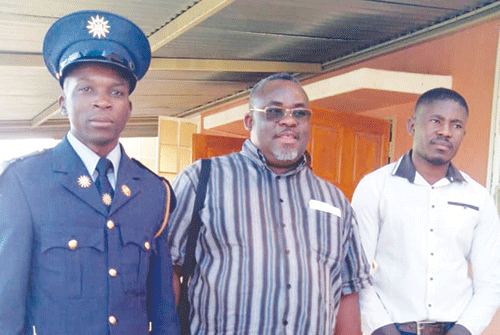Lahja Nashuuta
GROWING up in the streets of Katutura, Windhoek, Manasse Hambira is a committed public servant responsible for enforcing the law and protecting the community from criminal threats. He is a police officer serving in the Namibian Police Force.
Hambira always wanted to serve in the police force or military. From a tender age, he had the conviction that one needs to be a law enforcer to serve society in a meaningful and impactful way.
“It was my dream to work for the government, particularly in law enforcement — and in this case, the Namibian Police Force or Namibian Defence Force,” he said.
Haimbira is living his dream; protecting lives and property, as well as community intervention, have become part of his daily life.
But this is not too far-fetched from his first gig, which entailed peer counselling as a volunteer facilitator for the Young Christian Women Association, from 1999 to 2003, before travelling to the United Kingdom, where he spent two years, until 2005. Considering this, it is no surprise that he is currently studying for a bachelor’s degree in theology.
In his words, because he was a part of
this unit, fighting against crime became a passion, and ever since that time, he has made it his purpose to go against the negative impacts that emanate in our
societies because of this scourge.
“We provide community assistance in solving problems for which interventions are needed. Not all issues are supposed to end up in a court of law,” Hambira said, and clearly he might have learned this from years of being a member of the ‘youth against crime’ committee at school.
Joining the civil service
Upon his return from the UK, Hambira ventured into different jobs before stumbling onto the route that pointed straight to his destiny.
“In 2014, I attended the Danger Ashipala Police Training College in Ondangwa, and from there, as they say, the rest is history,” the Windhoek-born Shifidi High School matriculant said, adding that after completing his time through the drills, he has never looked back.
Asked what attracted him to public service, Hambira said he was convinced the government, despite some flaws, is the best employer.
“The government is the best employer in terms of fringe benefits. I am satisfied with the remuneration and other benefits, such as pension, medical aid, housing subsidy, and transport allowance.
In fact, he describes being in the force as highly rewarding in that with every encounter with the masses, there is a rewarding takeaway.
“I learn from the challenges I encounter on the job. It makes me ponder and understand why the person did what they did or is behaving in a certain way, and this gives me an idea of how to deal with similar situations in my personal life,” Hambira stressed.
“As police officers, we actually get to hear the real stories, some of which do not come out during court hearings because the courts do not operate from a place of empathy,” he added.
Hambira said he is fully aware of the prevalent perception that civil servants are largely lazy and do not work, but he believes this notion should be denounced with the disdain it deserves.
According to Hambira, such mindsets are held by people who are not aware of the chain of the flow of work within the civil service. He concurred that in certain government departments, work could be moving at a lethargic pace due to certain bureaucratic processes, but that is not the case within the police force.
“We work. Not only because we expect money to reflect in our bank accounts on the 20th of the month, but because we have taken a vow to serve and protect. We are duty-bound. It is a pledge that we are determined to live up to,” he added.
Hambira does not mince his words when he says that he is in the force to stay. At the age of 46, he is still adamant that he will give Nampol another 10 years of his vitality before resigning to other spiritually-oriented careers. “I still have a maximum of 10 years to go before I step out of government. I am currently studying theology, and after this job, I would like to get into something that has to do with societal reformation,” he said.
-lnashuuta@gmail.com


